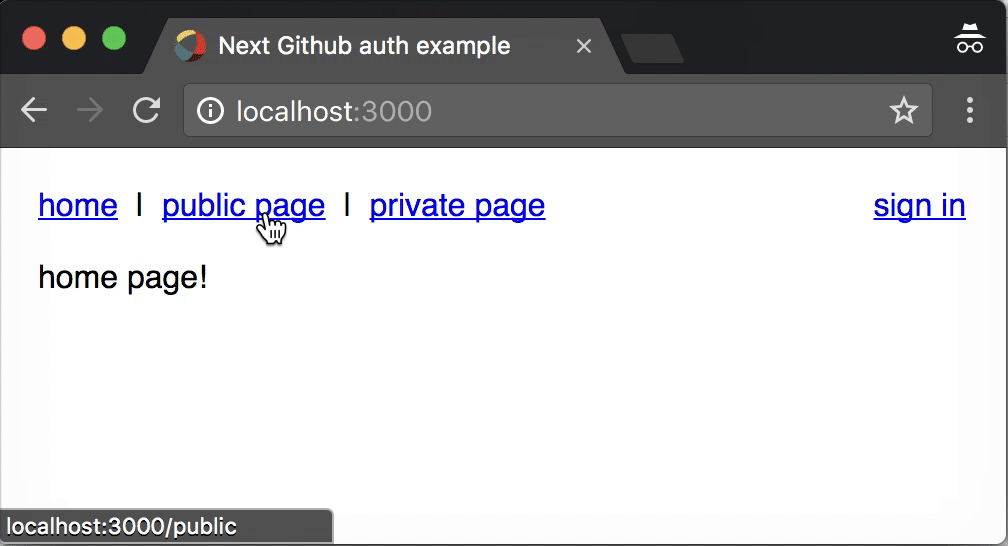Next.js auth with Github 

Components and decorators for using Github authentication with Next.js

Usage
-
Install into your Next.js app
yarn add next-github-auth -
Create
sign-inandsign-outpagesAt
pages/sign-in.jsimport { SignIn } from 'next-github-auth' export default SignInAt
pages/sign-out.jsimport { SignOut } from 'next-github-auth' export default SignOutIf you need to customize the scope you can configure the
SignInpageimport { configureSignIn } from 'next-github-auth' const SignIn = configureSignIn({ scope: 'repo gist' }) export default SignIn -
Wrap private pages with
PrivatePagedecoratorAny Next.js page that should only be accessible to authenticated users should be wrapped with the
PrivatePagedecorator, e.g.:import { PrivatePage } from 'next-github-auth' const Private = props => <div>private page!</div> export default PrivatePage(Private) -
Wrap public pages with
PublicPagedecoratorAll other Next.js pages should be wrapped with the
PublicPagedecorator, e.g.:import { PublicPage } from 'next-github-auth' const Public = props => <div>public page!</div> export default PublicPage(Public) -
Optionally access the currently signed in github user and access tokens in a Next page component's
getInitialProps, e.g:import React from 'react' import PropTypes from 'prop-types' import { PrivatePage } from 'next-github-auth' const UserRepos = ({ github: { accessToken, user: { login } } }) => ( <div> {!repos.length && ( <div>cool, you have 0 repos!</div> )} {!!repos.length && ( <ul style={{ margin: 0 }}> {repos.map(({ fullName }) => ( <li key={fullName}>{fullName}</li> ))} </ul> )} </div> ) UserRepos.getInitialProps ({ github: { accessToken } }) { const githubRepos = await getGithubRepos(accessToken) const repos = githubRepos.map(repoView) return { repos } } export default PrivatePage(UserProfile) -
Optionally access the currently signed in github user and access tokens via React's
context, e.g:import React from 'react' import PropTypes from 'prop-types' import { PrivatePage } from 'next-github-auth' const UserProfile = (props, { github: { accessToken, user: { login } } }) => ( <div> <div>{login}'s profile</div> <div>token: {accessToken ? 'hidden' : 'not available'}</div> </div> ) UserProfile.contextTypes = { github: PropTypes.shape({ accessToken: PropTypes.string, user: PropTypes.shape({ login: PropTypes.string }) }) } export default PrivatePage(UserProfile)
Setup app environment
-
Add an OAuth application to your Github account to generate a client id and secret
Set the callback URL to the public URL of the deployed app
-
Setup environment
Export your GitHub app's client id and secret as environment variables
export GITHUB_CLIENT_ID=YOUR_APP_ID export GITHUB_CLIENT_SECRET=YOUR_APP_SECRET
Run app
-
Start the app
yarn dev